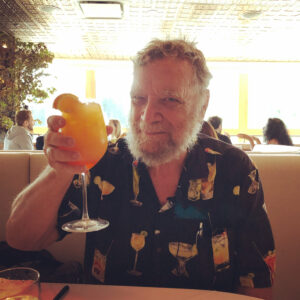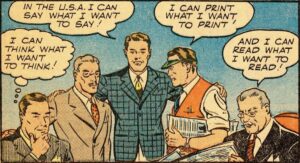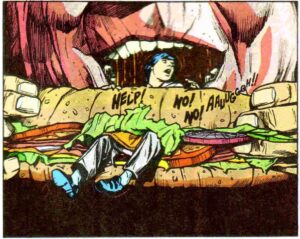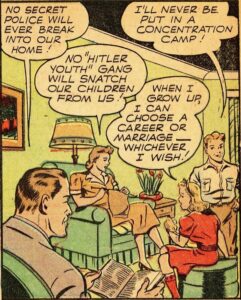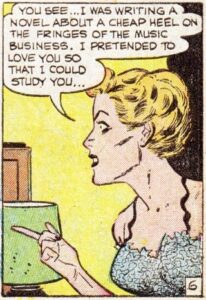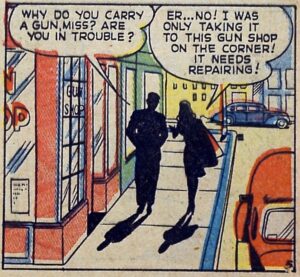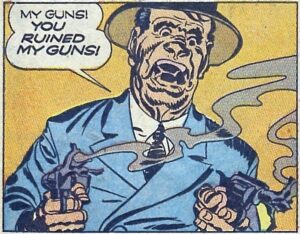Follow Scott
Recent Tweets
- Waiting for Twitter... Once Twitter is ready they will display my Tweets again.
Latest Photos
Search
Tags
anniversary Balticon birthdays Bryan Voltaggio Capclave comics Cons context-free comic book panel conventions DC Comics dreams Eating the Fantastic food garden horror Irene Vartanoff Len Wein Man v. Food Marie Severin Marvel Comics My Father my writing Nebula Awards Next restaurant obituaries old magazines Paris Review Readercon rejection slips San Diego Comic-Con Scarecrow science fiction Science Fiction Age Sharon Moody Stan Lee Stoker Awards StokerCon Superman ukulele Video Why Not Say What Happened Worldcon World Fantasy Convention World Horror Convention zombies
©2025 Scott Edelman
Munch Carnitas Benedict with the award-winning Michael Swanwick in Episode 184 of Eating the Fantastic
Posted by: Scott
Tags:
Eating the Fantastic, Michael Swanwick
Posted date:
November 4, 2022 |
No comment
Out in the flesh and blood world, the 80th World Science Fiction Convention is long over, but here at Eating the Fantastic — where I’ve already invited you to eavesdrop on my meals there with Wesley Chu, Carol Tilley, and Eileen Gunn — it lives on. This time around, for the fourth of six culinary conversations I managed to find time for during a busy Worldcon, I invite you to join me for brunch with Michael Swanwick
Michael has won five Hugo Awards and three Locus Awards, as well as a Nebula, World Fantasy, and Theodore Sturgeon Memorial Award — plus has been nominated for and lost more of these major awards than any other writer. His novels include Vacuum Flowers, Stations of the Tide, and Bones of the Earth, plus his most recent, City Under the Stars, a novel co-authored with the late Gardner Dozois. He’s also published a baker’s dozen of short story collections over the past three decades, starting with Gravity’s Angels in 1991 and most recently Not So Much Said the Cat in 2016, as well as the 118 short stories included in The Periodic Table of Science Fiction, one per each element. His recent novel The Iron Dragon’s Mother completed a trilogy begun with The Iron Dragon’s Daughter in 1993, which was named a New York Times Notable Book. Two of his short stories — “Ice Age” and “The Very Pulse of the Machine” — were adapted for the Netflix series Love, Death + Robots.
We discussed his response to learning a reader of his was recently surprised to find out he was still alive, how J. R. R. Tolkien turned him into a writer, why it took him 15 years of trying to finally finish his first story, how Gardner Dozois and Jack Dann taught him how to write by taking apart one of his tales and putting it back together again, why it was good luck he lost his first two Nebula Awards the same year, the good advice William Gibson gave him which meant he never had to be anxious about awards again, which friend’s story was so good he wanted to throw his own typewriter out the window in a rage, the novel he abandoned writing because he found the protagonists morally repugnant, why he didn’t want to talk about Playboy magazine, the truth behind a famous John W. Campbell, Jr./Robert Heinlein anecdote, and much more.
Here’s how you can join us — (more…)
Your context-free comic book panel of the day
Posted by: Scott
Tags:
context-free comic book panel
Posted date:
October 25, 2022 |
No comment
“Recollections of a Comic Book Writer of (almost) 50 Years” by Paul S. Newman
Posted by: Scott
Tags:
comics, Ellen Vartanoff, Paul S. Newman, Stan Lee
Posted date:
October 24, 2022 |
No comment
I found another treasure in the papers of my late sister-in-law Ellen Vartanoff — the text of a speech given in 1977 by comic book writer Paul S. Newman. Newman was listed in The Guinness Book of World Records as the most prolific comic book writer of all time, and since in 1977 he lived in the D.C./.Maryland area, she invited him to speak at one of the cartooning shows she curated back then.
Since I can’t find the text of this presentation anywhere else on line, I share it here with you. He called it —
“Recollections of a Comic Book Writer of (almost) 50 Years”
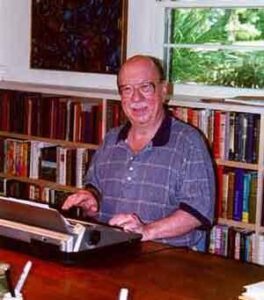
In the summer of 1948, after my fifth rewrite, I finally had my first comic book story accepted by National Comics (now DC).
It was for their Date with Judy teen-age humor book. My second story required only two rewrites. That assured the editor and me that I could write comic book scripts, but neither of us ever guessed I’d eventually write some 4,121 stories and still be writing them.
However, the truly amazing thing is not that I succeeded in selling so many stories, but to get the 4,121 approved, I had to submit an additional 5,000 plot ideas, which were rejected, and that despite all those rejections, I didn’t commit suicide.
Naturally, writing comics for fifty years leaves one with many memories. Here are some very random recollections:
I started writing for Stan Lee about 1950, probably with a story for Patsy Walker, and quickly went on to write for his science-fiction, “horror,” and other books. Stan was a smiling, encouraging editor to work with. I would bring in a plot outline, and Stan would immediately say “yes … no … ” or suggest a way to save it. Once, Stan seemed even more helpful, advising me that he would “give” me a plot, stating, “A man checks into a hotel …” I wrote that down rapidly. Stan continued, “They assign him a room on the 13th floor …” I noted that and there was a pause. I looked up from my pad. “And then, Stan?”
“Make it five pages, Paul.”
A year or so later, romance comics were hot (the sales, not the stories) and Stan said he wanted me to try writing some. I advised Stan that romance wasn’t my style. He shoved half a dozen romance books into my arms and said, “Try.”
The next day, I sent down a six pager, which began with a splash panel showing a girl dancing with one man and looking over his shoulder at another man in the background. “I was dancing with Ted. He pressed me close, but I knew it was the stranger in back, whom I really loved …” I was too much of a coward to subway down to Stan and watch his reaction, as he scanned it. I sent the story down by messenger.
A few hours later the phone rang. Sure it was Stan, I didn’t answer it until my wife forced the receiver into my hand. “It’s great, Paul. Give me three more.” And suddenly in half a dozen Marvel romance titles, I was pouring out my heart.
Although, writing for over six publishers in the early 1950s, I kept wanting to write for the biggest of them all, Western Publishing. The editor liked my published samples, but had no book available. I went back the following month, still nothing available. I went back the following month, and for ten more months, and then there was an opening: I began to write The Lone Ranger for the next 24 years. That was not my longest running comic. Turok, Son of Stone (not the stoned dinosaur hunter one) was. I kept Turok and Andar from escaping from Lost Valley for over 26 years, getting Turok out once, however, in an alien flying suácer in issue #58, July 1967.
Incidentally, except for 3 issues of Beware in the early 1950s, my name did not appear in print on any of the thousands (yes, thousands) of other stories I have written. Even among the five comic strips I wrote, only one, The Lone Ranger, carried my name.
Besides Stan Lee, one other editor was extremely important to me, Matthew H. Murphy, the brilliant editor at Western. While Western specialized in doing books based on licensed characters, and many of which I wrote: I Love Lucy, Gunsmoke, Lassie, Star Trek, and on and on, today, the properties that are still going on are two originals that Matt developed and which I wrote, with some creative input as well: Turok, Son of Stone and Dr. Solar.
In the course of writing so many licensed TV and film properties, I frequently met the “live” heroes of my books. Clayton Moore (The Lone Ranger) turned out to be a charming man, whose eyes (even when seen through the Ranger’s mask’s openings) suggested authentic sincerity, and whose deep, authoritative voice convinced me that was how the old Testament’s prophets must have sounded. There was Clint Walker (Cheyenne) looming over me, a friendly giant, in whose huge extended hand I lost mine. But the most unusual “live” hero I ever met wasn’t even human; he was Smokey the Bear.
The Forest Service flew Morris Gollub, the talented artist of the series and the comic strip, and me to Washington for a publicity photo with Smokey. Unfortunately, when we reached his caged-in area, Smokey had retreated into the shadowy depths of his “cave”. The keeper called. Smokey did not come out. The keeper tossed some ursine delicacies in front of the cave. Smokey did not come out. The keeper entered the cave and pushed. Smokey did not come out. The photographer stood waiting with the frustration we all shared, when I offered, “I know Smokey’s psychology better than any of you. I write his dialog. I know what will get him out.” By that time Smokey was popular enough to have a whole line of souvenirs and memorabilia for sale. So I tossed a quarter in front of his cage. CLINK! A moment later, the market-oriented bear emerged, and we got our photo.
As far as artists were concerned, I knew only two of them fairly well: TOM GILL (The Lone Ranger) and Albert Giolitti (Turok). I actually avoided meeting fellow writers and artists, as all I wanted to do was get to my publisher, discuss plots with the editor, go home and write stories.
I wrote comic books to pay the mortgage, the food bill, and for my kids’ new shoes. I certainly enjoyed it and was lucky in that I could write some 2,000 pages a year during several years. I never even complained about my name not being on a comic book page — as long as it was spelled correctly on the check, for I “knew” what would bring me fame and fortune. It wasn’t comics. It was writing plays for Broadway, and screenplays for Hollywood. And while I have had five plays optioned for Broadway, and have sold five screenplays to movie producers, I have never had any of those scripts produced. Thanks to good genes and even better physicians, I am still writing at 73, both for the comics, as well as having two screenplays currently surfing around the West Coast, and just delivered a new novel to a top agent. Maybe next year, one of them will hit. Meanwhile, as we said in the old days — “see you in the funny pages!”
And I hoped you enjoyed some stories I wrote on my way to becoming, King of the Comic Book Writers.
Your context-free comic book panel of the day
Posted by: Scott
Tags:
context-free comic book panel
Posted date:
October 24, 2022 |
No comment
Your context-free comic book panel of the day
Posted by: Scott
Tags:
context-free comic book panel
Posted date:
October 23, 2022 |
No comment
Your context-free comic book panel of the day
Posted by: Scott
Tags:
context-free comic book panel
Posted date:
October 22, 2022 |
No comment
Dig into dim sum with the Nebula Award-winning Eileen Gunn in Episode 193 of Eating the Fantastic
Posted by: Scott
Tags:
Eating the Fantastic, Eileen Gunn, Worldcon
Posted date:
October 21, 2022 |
No comment
Welcome back to another culinary conversation from the 80th World Science Fiction Convention, where you’ve already joined me for brunch with Wesley Chu and lunch with Carol Tilley.
My guest this time around is Eileen Gunn, who received the Nebula Award in 2005 for “Coming to Terms,” a story inspired, in part, by her friendship with Avram Davidson, about whom she’s working on a biography. She also won Japan’s Sense of Gender Award, and has been nominated for the Hugo, Philip K. Dick, Locus, and Tiptree awards. Her short story collections include Stable Strategies and Others (2004), Questionable Practices (2014), and most recently Night Shift Plus … , out earlier this year as part of the PM Press Outspoken Authors Series. From 2001-2008, she was editor and publisher of the influential webzine The Infinite Matrix. She served for 22 years on the board of directors for Clarion West, and taught there and at numerous other creative writing workshops. She also had a lengthy career in technical advertising and website management in Boston, Seattle, and New York.
We discussed how it’s possible to write when you always have writers block, the Ursula K. Le Guin story which convinced her she could have a career in science fiction, the two most important things she wants aspiring writers to know, her early advertising career writing funny ads for shoes she didn’t like, the reason she believes “I don’t decide what the story is until after I’ve finished it,” which famous science fiction writer wrote the box copy for Screaming Yellow Zonkers, the question Kate Wilhelm asked her at Clarion which unlocked the unknown ending of a story in progress, the way her years in the ad business helped her become a better writer, how Carol Emshwiller made her a person of interest with a sheriff’s department, what she said on a Worldcon panel which was so outrageous the audience had to be told she was joking, how Psychology Day magazine was almost sued over Frankenstein because they didn’t listen listen to my advice, and much more.
Here’s how you can join us at Chicago’s MingHin cuisine — (more…)
Your context-free comic book panel of the day
Posted by: Scott
Tags:
context-free comic book panel
Posted date:
October 16, 2022 |
No comment
Your context-free comic book panel of the day
Posted by: Scott
Tags:
context-free comic book panel
Posted date:
October 13, 2022 |
No comment
Your context-free comic book panel of the day
Posted by: Scott
Tags:
context-free comic book panel
Posted date:
October 12, 2022 |
No comment

